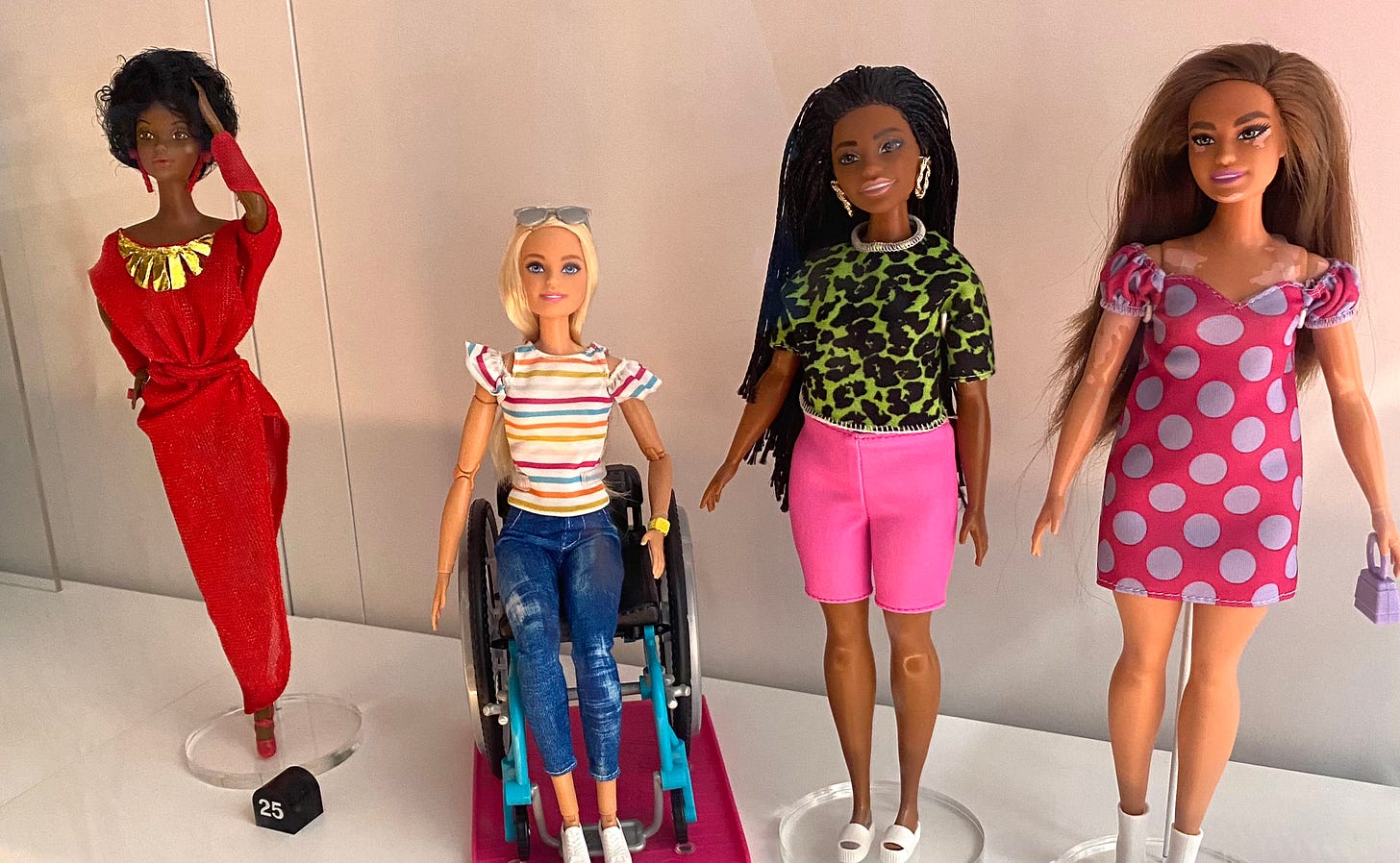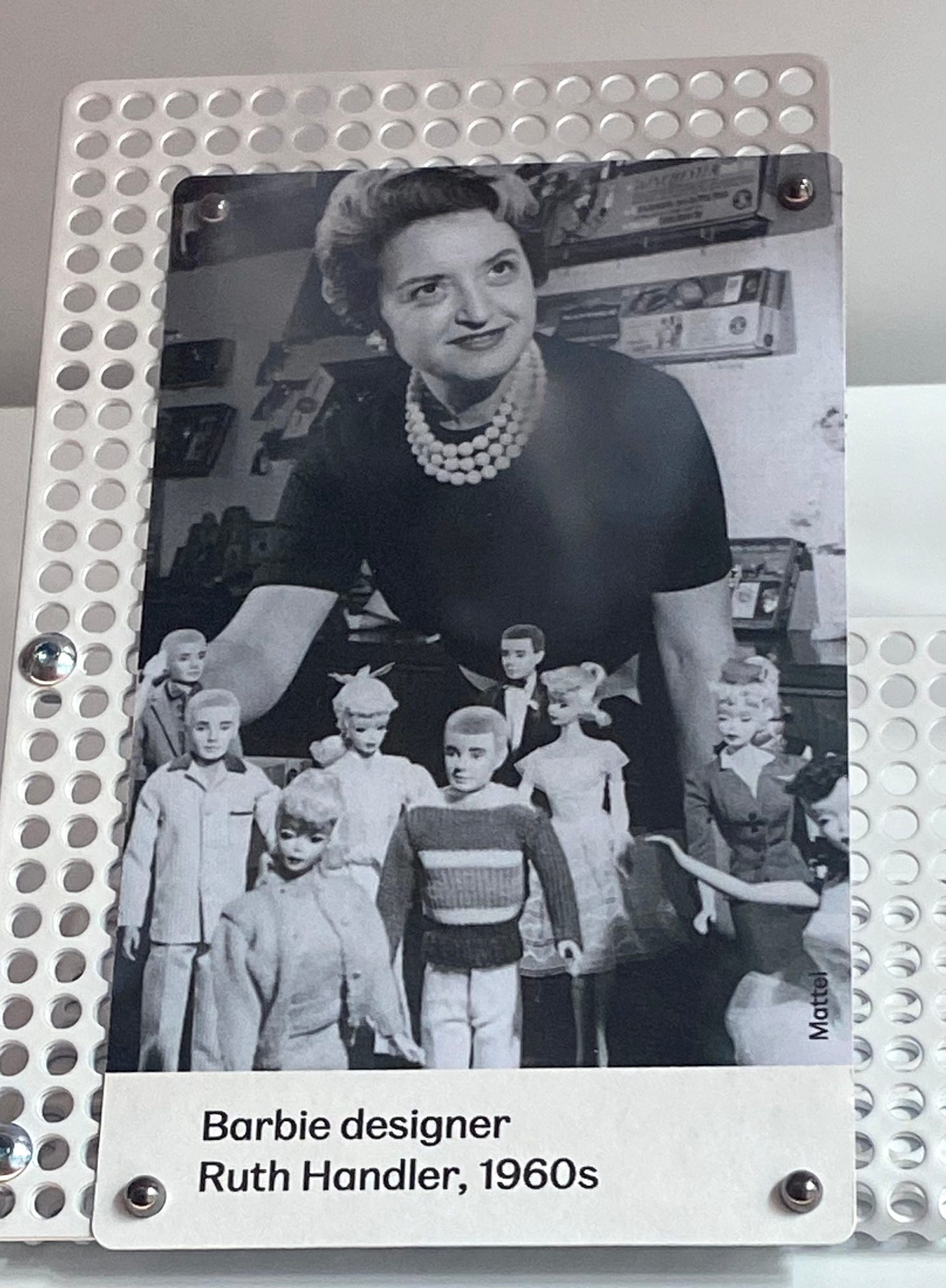
I finally saw Barbie in the theatre last week. (Some spoilers ahead, obv.) When I got home and my partner asked how it was, I wasn’t sure what to say. I laughed, but no tears were shed, and I couldn’t figure out why, or when in the movie people cried multiple times (as noted on social media and in the many intelligent and fantastic reviews I read). The only time I got a bit emotional was during the video montage near the end, but I am a sap for family videos, especially if a melancholic song plays in the background.
In hindsight, I probably read too much stuff about the movie before I went, so there were expectations, and I already knew about the main themes and pivotal moments. Parts of it, like Gloria’s monologue, didn’t feel as powerful, novel or the same way it probably would have had I not read extensively about that scene beforehand. Or maybe there was just something missing for me, and it wouldn’t have mattered how many reviews I read before seeing it. I love Rhea Perlman, but I was not into that speech near the end. I mean, that line about mothers standing still so daughters can see how far they’ve come! Why perpetuate the devastating and dangerous idea that mothers are less important than their children? Clearly, Barbie’s job in the real world is to shepherd those mothers forward!
(Side note: I am a big Greta Gerwig fan so really wanted to love, love Barbie. I know she didn’t direct them, but I adored both Frances Ha and Greenberg and I am pretty sure I watched her dance to Arcade Fire’s Afterlife at the YouTube Music Awards a dozen times when it first aired.)
As you probably guessed from the header, I want to add something to the Barbie writing canon by discussing…the Duolingo Dad!

In case you didn’t know (I didn’t!), Ryan Piers Williams who plays “El Esposo de Gloria” (Gloria’s husband) is the real-life husband of America Ferrera, who plays Gloria, the Barbie-loving human from the real world and tortured mom of a teen. There is a scene in the movie when Gloria and her daughter are about to go to Barbieland and Sasha, the daughter asks, “What about Dad?” You then see Dad at home alone, sitting on the couch and learning Spanish on his phone through the language app, Duolingo. At the end of the movie, Williams makes another appearance, this time practising his Spanish in front of his wife, his daughter and Barbie, only to be corrected by his wife for mispronouncing “orgullosos” and told by his daughter he can’t say, “Sí se puede”, because it is cultural appropriation.
Sí se puede (Yes, she can) is apparently an ode to Ferrera’s 2002 movie, Gotta Kick It Up! I haven’t seen the movie, but it was the first Disney movie with Latina protagonists and incredibly inspirational for young Latina girls who finally saw themselves represented onscreen, according to a quickly online search. Sí se puede also refers to the labour leader and rights activist, Dolores Huerta, who fought for better working conditions and rights for farmworkers with the United Farm Workers in the U.S. in the 1960s and coined the slogan. (Cesar Chavez was also associated with the slogan and you can read a lot more about it here). The joke here, as per a few online forums, is that Sí se puede is also a common phrase that isn’t always associated with Huerta or cultural appropriation, but since Sasha, a teen, says it is cultural appropriation, it is a nod to the times.
Cultural appropriation is a complex subject and vital in the discussion of who gets to be bilingual and how that plays out in language learning and teaching. But a good general reminder when it comes to language is that not all bilinguals are bicultural and not all biculturals are bilingual.
There are some interesting theories floating around online about the Duolingo Dad in Barbie. One post says the dad must actually be a stepdad and has not been around that long if he is only now learning beginner Spanish. (Since Gloria corrects her husband’s pronunciation, there is the assumption that she is fluent.)
But language learning is a long and convoluted process, especially as an adult language learner and especially if you’re not immersed in the language but mostly learning it through an app (no offense Duolingo). I have been with my partner for more than 15 years and he has been learning Polish off and on for years through Duolingo. Learning an additional language requires time, exposure and input and rarely can you get all three if you’re not immersed in the community where that language is the majority one. So, I don’t think the dad learning beginner Spanish at this point is unbelievable, even after more than a dozen years of being with his Spanish-speaking spouse (again, this is an assumption she is a Spanish speaker because she corrects him in the car).
I am biased because I read a lot of posts on multilingual parenting forums and have interviewed mothers for my research about how their partners are not supportive of bilingualism in the family because they feel left out, for example. So, I am all for a dad showing his commitment and support of a heritage language, in any way. We can laugh at Duolingo Dad, but good for the white middle-aged guy learning Spanish, especially if he is doing it for his partner and child! Gerwig began writing Barbie in 2020, at the height of the pandemic, when language-learning apps were exploding because people were in lockdowns, looking for more indoor hobbies so the Duolingo nod could be part of that as well. (According to this, Duolingo did not pay for the placement but there was an ad collaboration for something that appeared before the movie in theatres.)
The second Duolingo Dad scene, at the end of the movie when Gloria, Sasha and the dad are in the car and Barbie is getting out, is a bit more complicated to break down. Gerwig is obviously smart, so I think there are many layers to this scene. I think Gloria correcting her husband’s Spanish pronunciation when he tells Barbie in Spanish, they are proud of her, works so well because in the “real world” (not Barbieland), men correct women all the time.
Also, if you do a little searching on Ferrera’s background, she has been, in real life, accused of not speaking Spanish well enough or as fluently as people think she should as a Latina. Ferrera is the daughter of Honduran immigrants and grew up in the U.S. and has said in interviews her Spanish is not fluent. In this scene, she gets to be the one who asserts her fluency as payback to all the asshole film execs, or maybe sadly members of the Latino/Latina communities, who accused her of not being Latina enough because of her Spanish.
This is a common occurrence where first-generation children of immigrants don’t speak their parents’ heritage language for a variety of reasons. Predominantly is is because English is considered the language of school and success or because the parents are trying to protect children from the same abuse and discrimination they faced. As Ferrera mentions in interviews you can find online, she was made fun of by classmates for not speaking Spanish well enough, while in auditions, asked to read something in a “more Latina” way (read: in what the film people considered “broken English”).
According to online posts, people “felt seen” after the Duolingo bit and some even went home to do their daily language practice! What I would have loved at the end of the car scene is if stereotypical Barbie would have turned to Duolingo Dad and answered him in fluent or beginner Spanish. Barbie is in the real world now and bilingualism is part of the real world, at every fluency level!
A few more things:
I am not going to link to all the essays I enjoyed about Barbie as there are so many. But this one by Chavisa Woods deals specifically with language in a brilliant way, especially around the myth that women talk more than men. It also addresses that horrible line I mention at the beginning of this newsletter about mothers standing still for their daughters and goes into why “women hate women” is also so problematic. Woods made me consider why I didn’t love the movie and helped me understand why something felt off. I too really disliked that part when Barbie tells the elderly woman (played by Ann Roth, an Oscar-winning costume designer and friend of Gerwig's) she is beautiful. I often say, a good comparison is whether a man/father would ever do that?
People listen to Adam Grant so I am glad he wrote this Opinion piece about how it is not women’s language that is weak but it is our perception of what is assertive versus aggressive. But linguists, especially female linguists, have been saying the same thing, how society needs to change, not the way women speak, for years. Sigh.
We finally watched Spider-Man: Into the Spider-Verse with my kids as they are old enough now and I love how Miles’s mom speaks Spanish to him. We’ve watched the sequel trailer and I know there is a part when Miles’s parents find out he got a low grade in Spanish class and his mom is not happy. Now that was a scene that made me emotional because I so relate to the mom.
Thank you for reading and let me know your thoughts on Barbie or anything else in the comments!






A lot to unpack and think about. I haven’t seen it but I agree that a partner who is learning a language should always be applauded even if they are still beginner❤️
I haven't seen the Barbie movie but you made some interesting points. I do agree with you that there's nothing wrong with learning the language of learning a language later in life so you can better communicate with your partner or child.